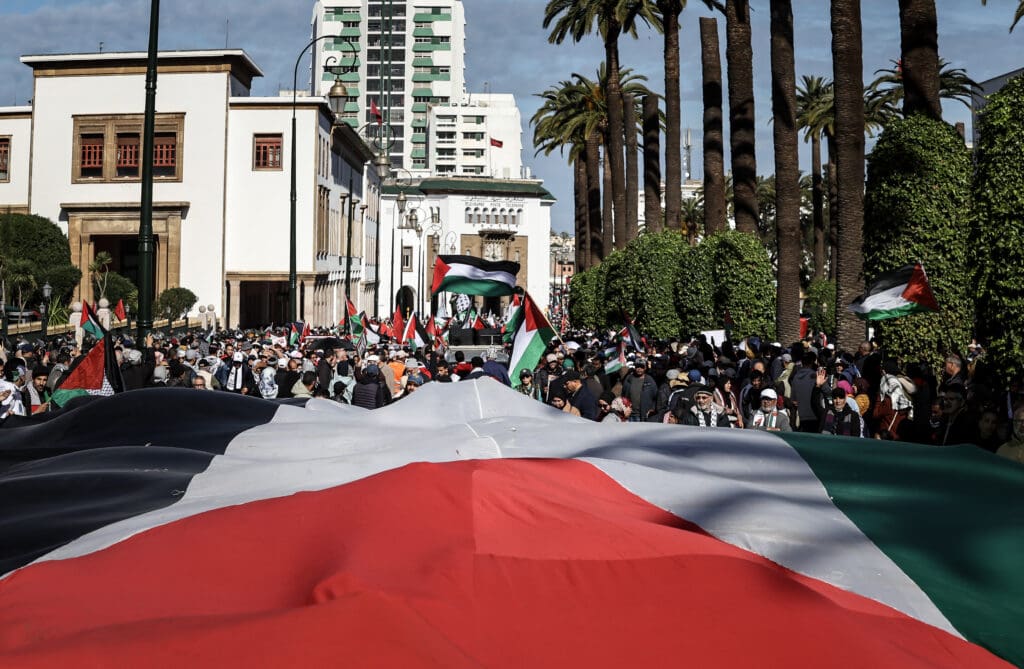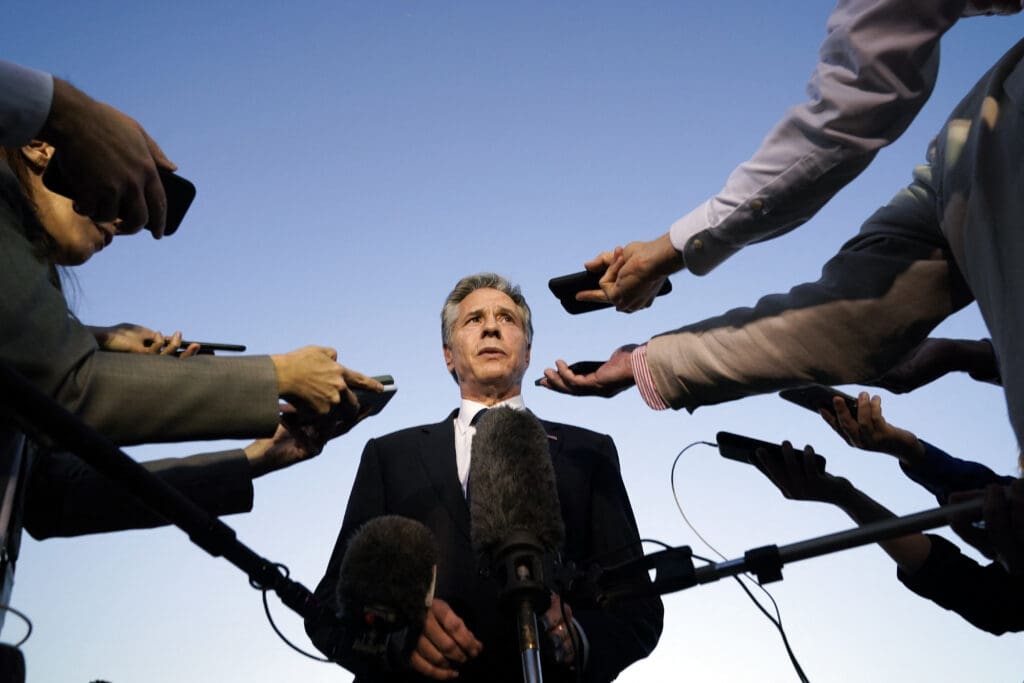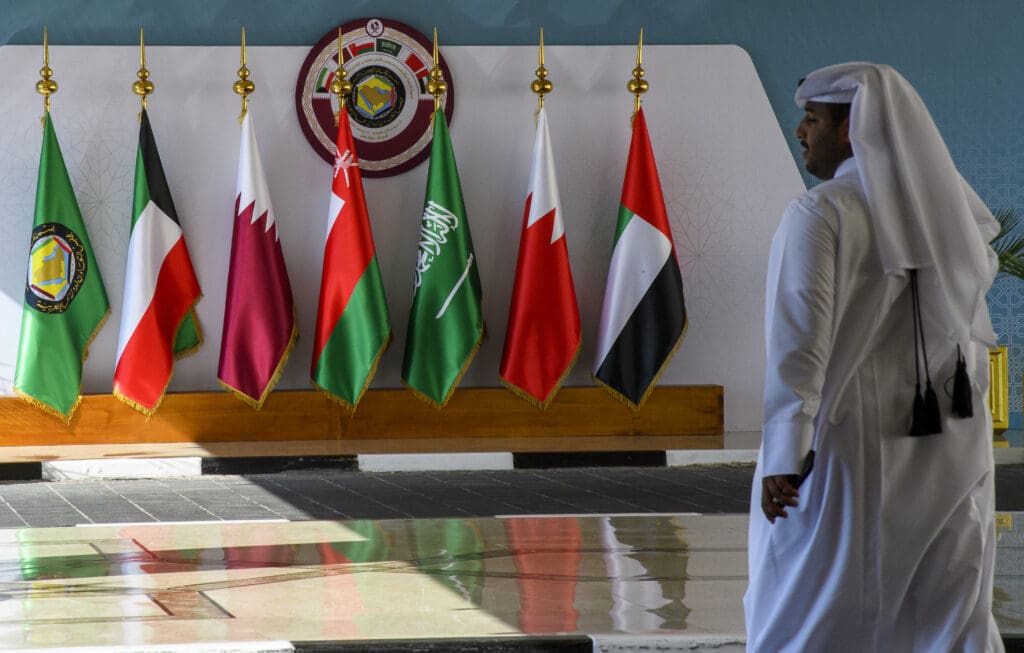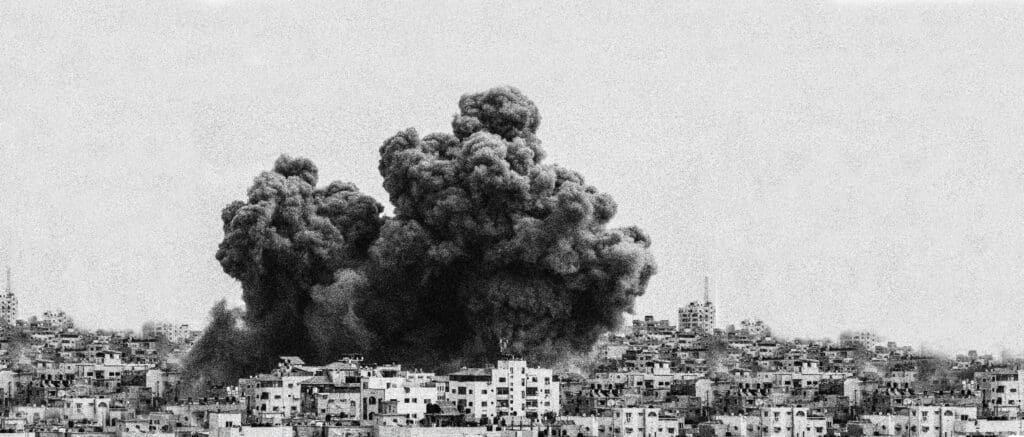Editor’s Note: There Are No Winners Here
Omar H. Rahman, Fellow and Editor of Afkār, Middle East Council on Global Affairs
The Israeli-Palestinian conflict did not begin on October 7, 2023. Decades of military occupation, colonial land theft and systemic deprivation had already pushed Palestinians into a state of constant struggle, laying the groundwork for the Hamas-led attack on Israel that left 1,139 dead. However, the events of that day unleashed a wave of violence that has reverberated through Palestine, Israel and the wider region, with impacts that will likely be felt for generations. As I wrote on that fateful day—even when only 100 Israelis were reported to have been killed at the time of publishing—“this event will leave no one and nothing untouched.”
A year later, it is staggering to witness the devastation in Gaza. Despite being extensively documented in real time, the violence continues unabated. At least 42,000 people, mostly women and children, have been killed and over 100,000 injured. The true scale of the death toll is likely much higher, as continuous bombardment has made accurate reporting impossible. Two million people have been displaced, and famine and disease are ravaging the population. The critical infrastructure in Gaza has been decimated, leaving the territory in ruins—uninhabitable for the foreseeable future.
This tragedy has been compounded by the crisis of leadership in the Palestinian national movement. No one has been visibly at the helm, navigating through the treacherous events of the last year or rallying nations to the people’s defense.
Regionally, too, there has been little visible activity to bring the war to an end. While several states in the region have engaged in diplomacy aimed at both a ceasefire and a broader political solution, none have been able to exert influence over Israel or leverage their significant economic and political clout over Israel’s backers. As a result, the region remains on edge with the threat of a wider war still looming.
In this respect, the region has been effective in preventing a larger conflagration. However, in recent weeks the Lebanon front has escalated dramatically and, along with devastating consequences for the country, has led to another direct confrontation between Israel and Iran.
A year on, it is difficult to see how there are any winners in the current situation. The devastation being wrought will likely sow the seeds of generational unrest, radicalization and conflict. Even Israel, which may appear to have the upper hand vis-à-vis its adversaries in the “Axis of Resistance,” has no clear long-term strategy for achieving security for itself or permanent peace in the region.
To mark this one-year milestone, Afkār invited a selection of leading analysts and thinkers from across the Middle East and North Africa to reflect on the past year and consider the long-term consequences for the region’s future.
Mobilizing for Palestine: Beware What Lies Beneath the Still Waters
Nadim Houry, Executive Director, Arab Reform Initiative

A year of unfolding horrors in Gaza, now spilling over into Lebanon, has left plenty of people in the Arab region seething. So far, however, their anger has been expressed in a mostly subdued manner. While Palestine has always been a key source of mobilization in the Arab region, and there have been some large demonstrations in Arab capitals, this time around the protests have been mostly channeled into consumer boycotts. While this passive resistance may affect the bottom line of some fast-food chains, it has not led any Arab government to revisit its policies or revoke its normalization deals with Israel.
To understand this, one has to examine the current political moment in the region and the evolution of contestation patterns in Arab societies. The peoples of the region are exhausted after a breathtaking sequence of events: the 2011 uprisings and the ensuing wars in Libya, Syria and Yemen; the autocratic restoration after 2013 that crushed civil society and sent activists to prison or exile; the rise and fall of ISIS; the 2019 uprisings in Sudan, Lebanon, Algeria and Iraq; and finally the Abraham Accords that saw a number of Arab countries normalize relations with Israel.
This has left people numb and uncertain about the impact of collective action. In a region where protests are violently repressed and speaking out can lead one to end up in jail, boycotting U.S. brands is a low-risk way of collectively expressing anger at the U.S.-enabled Israeli genocide in Gaza. It is also a method of action that speaks to a younger generation that approaches its consumer behavior as an extension of its political and ethical positions.
Despite their proliferation, these boycott movements have had a limited impact on Arab governments’ policies and relations with Israel. As of May 2024, Israel’s trade with the UAE, Egypt, Morocco and Bahrain increased since the beginning of the year despite the atrocities in Gaza. Even Israel’s arms dealings in the region seem unaffected. Israeli drone manufacturer BlueBird announced in April 2024 the opening of a production site for unmanned aerial systems in Morocco at the same time as the North African country was experiencing large protests against Israeli actions.
This continuation of business as usual may comfort Israel and the United States, but this would be shortsighted. An Arab Opinion Index poll conducted between December 2023 and January 2024 showed that an overwhelming 92% of respondents from across the region “believe that the Palestinian question concerns all Arabs and not just the Palestinians.” Meanwhile 94% of the Arab public deemed the American position to be either bad or very bad. These numbers, which anyone from the region can confirm reflect the nature of discussions in their immediate circles, suggest a subtle and long-term shift. A new generation of Arab youth is being politicized around Palestine as they stream videos on social media platforms like TikTok and Instagram.
But perhaps even more immediately, the region’s elites—who had aligned themselves behind the U.S. in recent decades—are increasingly questioning their relations with a Western world that they see as indifferent to their suffering and holding double-standards in its support for human rights and international norms. As a cynical Western official recently told me, “Arabs still send their children to study in the U.S. and UK, and not to China or Moscow.” This may well be true, and no immediate change in policies may be on the horizon, but, in their intimate discussions, more and more Arab elites are aware of their populations’ discontent. They are slowly drifting away from the West and seeking other partnerships. They may not know yet where they will land, but a tectonic shift seems underway.
U.S. Diplomacy and the Failure to Prevent Regional Escalation
Joseph Bahout, Director, Issam Fares Institute for Public Policy and International Affairs (IFI)

On the eve of October 7, 2023, U.S. National Security Advisor Jake Sullivan infamously described the region as “quieter than it has been for decades.” With today marking 12 months of bloodshed in Gaza, and amid the outbreak of full-fledged war in Lebanon, these words not only highlight the analytical myopia of Western decision-makers but also underscore their inability—or unwillingness—to stop the drift towards a regional abyss.
After failing to force a ceasefire deal in Gaza that would free the remaining hostages in Hamas’ hands, Western diplomacy—particularly Washington’s—seems equally impotent to roll back the Israeli war machine from its assault on Lebanon.
What Hezbollah launched on October 8, 2023, as a “war of support and diversion,” to provide a counterweight to the Gaza front and alter the overall conflict equation, has escalated into a front of its own. Now, Israel and Hezbollah may well continue their war even if fighting stops in the Palestinian enclave.
Here, on that front, the future of the region is at stake within a terribly intertwined set of parameters. Ostensibly, Israeli Prime Minister Benjamin Netanyahu’s aim is to return the estimated 80,000–100,000 displaced Israelis to their homes in the country’s north, which would imply new security arrangements at the Lebanon-Israel border and a revision of UN Security Council Resolution 1701 adopted to end the July 2006 war.
However, a second aim hovers behind this one. Some of the more hawkish military and political figures in Israel sense that this could well be an ideal pretext for the country to seriously diminish Hezbollah’s military, security and political apparatus in Lebanon and erode its grip on the country’s decision-making, as part of a larger Israeli challenge to the “Axis of Resistance.” For some Israeli strategists, the ultimate end goal remains escalating the conflict further to provoke Iran, thus also forcing the United States to side with Israel in a regional confrontation they could no longer avoid.
In this complex equation, it is all the more striking that domestic political factors, both in Israel and the United States, play a crucial role in enabling the unfolding tragedy. Israel’s prime minister is ready to go all the way in his bellicose adventure, as his only way to escape political and judicial death, and the U.S. administration remains paralyzed by the looming, fateful elections.
Deterrence Under Duress
Hamidreza Azizi, Nonresident Fellow, Middle East Council on Global Affairs

One year after the outbreak of the war on Gaza, Iran has achieved notable diplomatic gains but also faces growing security challenges and potential geopolitical setbacks.
One of the most significant opportunities for Iran has been the disruption of the Arab-Israeli normalization process, particularly the halt in progress on establishing formal relations between Israel and Saudi Arabia. The ongoing war and widespread public outrage over Israel’s actions in Gaza have made it difficult for Arab leaders to openly pursue formal cooperation with Israel. This has slowed the momentum of the Abraham Accords, which had previously posed a threat of further isolating Iran in the region.
Meanwhile, Tehran has focused on bolstering its own diplomatic relationships with Arab states. The steady improvement in Iran-Saudi ties and ongoing discussions with Egypt and Jordan have enabled Iran to improve its regional standing and counter the potential formation of an anti-Iran coalition. The prolonged war has also drawn global attention and increased international criticism of Israel. Iran has sought to leverage this shift in global public opinion to reinforce its narrative that Israel, not Iran, is the root cause of regional instability.
However, Iran has begun to face increasing challenges within its network of non-state allies and proxies known as the “Axis of Resistance.” In the early months of the conflict, the network demonstrated significant coordination, effectively launching a joint, multi-front war against Israel. Nevertheless, Israel’s targeted assassinations of Hamas and Hezbollah leaders, along with its continued operations to degrade the military capabilities of Iran’s allies, have cast uncertainty over the network’s future. This raises questions about the long-term effectiveness of Iran’s “forward defense” doctrine—particularly its strategy to counter Israel.
At the same time, while Tehran’s use of proxy forces has imposed significant costs on Israel, it has also highlighted Iran’s security vulnerabilities. Despite the pressure exerted by these groups, they were unable to prevent Israeli strikes on Iranian personnel and facilities in Syria or halt Israeli covert operations within Iran. The assassination of senior Iranian commanders, ongoing airstrikes on Iran-linked targets in Syria and the killing of Hamas leader Ismail Haniyeh in Tehran underscore the limitations of Iran’s deterrence capabilities and reveal the extent of Israel’s intelligence penetration.
In addition, the war has led to an increased U.S. military presence in the region, which undermines Iran’s strategic objectives. Washington has bolstered its military support for Israel and deployed additional forces to counter threats from Iran and its allies, assisting Israel in defending against the recent barrage of Iranian missiles. This heightened American presence complicates Iran’s efforts to reduce U.S. influence in the region—at least in the short term.
Looking ahead, Iran is likely to continue backing the “Axis of Resistance” and focus on revitalizing the capabilities of its allies, particularly Hezbollah, while reassessing its overall military strategy. The war has sparked internal debate in Iran about the need for stronger deterrence, including the potential pursuit of nuclear weapons. This “ultimate deterrent” could become more attractive if Tehran faces direct Israeli attacks or becomes entangled in a broader conflict with Israel.
Qatar’s High-Stakes Mediation
Tarik M. Yousef, Director and Senior Fellow, Middle East Council on Global Affairs

Beyond the staggering human toll of the past year, Israel’s devastating war on Gaza has accelerated a shift in geopolitics. Amid a global transition away from unipolarity toward a more fluid and uncertain international order, emerging middle powers in the Global South are asserting greater agency, navigating ties with traditional great powers.
Qatar has responded to this changing landscape by doubling down on its role as a mediator, particularly between the United States and actors Washington refuses to engage directly. As regional states have grown disillusioned with the United States’ reliability as a security partner—and as the country’s favorability plummets in the region due to its staunch support for Israel and undermining of international law—Qatar’s value as a diplomatic partner for Washington has only grown.
While Doha’s mediation efforts have made headlines, they have also drawn increasing criticism, especially over its involvement in Hamas-Israel negotiations and its role in hosting political representatives of Hamas and other non-state actors. These critiques, however, are not new. Qatar has faced backlash since the Arab Spring for its assertive regional role, culminating in the blockade imposed in 2017. Since then, it has shifted to a more neutral stance, carefully positioning itself as a third-party mediator while maintaining open channels with a broad spectrum of actors—from the Taliban to Iran, Hamas and Nicolás Maduro’s regime in Venezuela.
This mediation-centric foreign policy is not without risks. Qatar’s growing diplomatic prominence has made it a target for criticism, particularly from members of the U.S. Congress. Recently, three senators introduced a bill calling for a reconsideration of Qatar’s designation as a major non-NATO ally, citing the presence of Hamas’ politburo in Doha and Qatar’s ties to other non-state actors.
What this criticism misses is that these relationships serve U.S. interests, facilitating essential backchannel negotiations that would otherwise not exist. These ties have been developed in coordination with Washington, reflecting a pragmatic approach to diplomacy rather than the ideological and moralizing alliances that the critics would prefer. Moreover, such critiques conveniently overlook the moral contradictions in Western foreign policy—particularly the unequivocal support for Israel’s war on Gaza and the failure to prevent escalation in Lebanon and throughout the region that has brought it to the brink of all-out war.
In the face of this criticism, Qatar has signaled some reluctance about its ongoing role. In April, Qatari Prime Minister and Minister of Foreign Affairs Sheikh Mohammed bin Abdulrahman Al Thani announced that Qatar was conducting a “full evaluation” of its role in brokering ceasefire talks between Hamas and Israel. With a U.S. election on the horizon, politicians may increasingly target Qatar to score points with their bases, further complicating Doha’s delicate diplomatic balancing act.
Qatar now stands at a crossroads. The choices it makes will determine not only its own diplomatic future but the future of mediation in an increasingly multipolar world. As criticism mounts, Doha must navigate these challenges with the same careful diplomacy that has defined its foreign policy for the past decade.
The Palestinian Cause Is Saudi Arabia’s Top Concern
Abdulaziz Sager, Founder, and Chair of the Gulf Research Center

Saudi Arabia’s concern for the Palestinian cause dates back to its origin. When the late King Abdulaziz Al Saud met U.S. President Franklin D. Roosevelt aboard an American warship in the Suez Canal in 1945, the Palestine question was their main topic of discussion. King Abdulaziz, the founder of the modern Saudi state, rejected Jewish immigration to Palestine and said: “The Arabs would choose to die rather than yield over their lands to the Jews.”
Ever since that meeting, the kingdom has placed the Palestinian cause at the forefront of its concerns. Saudi support for the Palestinian people has taken many forms, from significant financial support to proposing several peace initiatives spanning decades. In 1981, for instance, then-Crown Prince—and later King—Fahd bin Abdulaziz, put forward what became known as the Fahd Peace Plan, which was later adopted as the Fez Initiative in 1982. Later, the late King Abdullah bin Abdulaziz spearheaded the groundbreaking Saudi proposal approved by the Arab League at the 2002 summit in Beirut. Known as the Arab Peace Initiative, it remains on the table to this day.
Following the events of October 7, King Salman convened an extraordinary joint Arab-Islamic summit in November 2023 to discuss the repercussions of the situation in Gaza. The summit collectively condemned Israel’s aggression and described the situation as a humanitarian catastrophe. On the back of this summit, the kingdom formed a ministerial committee headed by its foreign minister, tasked with presenting the summit’s resolutions and Arab and Islamic demands to the United Nations and world powers. The committee played a major role in persuading several countries to recognize a Palestinian state and promoting its acceptance to membership in the United Nations through a vote at the General Assembly.
On September 18, 2024, at the opening of the ninth session of the Saudi Shura Council, speaking on behalf of King Salman, Crown Prince and Prime Minister Mohammed bin Salman said: “The Palestinian issue is at the forefront of the kingdom’s concerns. We renew the kingdom’s rejection and strong condemnation of the Israeli occupation authorities’ crimes against the Palestinian people, which disregard international and humanitarian law in a new, bitter chapter of suffering. The kingdom will not cease its tireless work towards the establishment of an independent Palestinian state, with East Jerusalem as its capital.”
The crown prince added: “The kingdom will not stop its tireless work towards the establishment of an independent Palestinian state with East Jerusalem as its capital, and we affirm that the kingdom will not establish diplomatic relations with Israel without that.”
Saudi Arabia also submitted a statement to the International Court of Justice on February 20, 2024, confirming the illegality of Israel’s 57-year-old occupation and calling on Israel to end it. Following Israel’s most recent attack on Lebanon, the kingdom’s ministry of foreign affairs issued a statement urging all parties to exercise the utmost restraint and to spare the region and its people the ordeal of another war.
These initiatives amount to just some of what Saudi Arabia is doing to support the Palestinian cause, through diplomatic efforts at various international and regional forums, by adopting and presenting diplomatic proposals and initiatives and urging the world to end the occupation and implement the two-state solution. The kingdom spared no effort in promoting reconciliation and unity between Palestinian factions, including hosting a reconciliation meeting in Mecca to push for a Palestinian consensus and to unify efforts toward achieving Palestinian demands.
Saudi Arabia is hoping for a quick end to the Gaza war, for the reconstruction of what was destroyed, and for the people of Gaza to be reunited in their homeland and live a dignified life.
Palestinian Statehood Tops GCC Security Agenda as Diplomatic Struggles Persist
Dania Thafer, Executive Director, Gulf International Forum; Nonresident Senior Fellow, Middle East Council on Global Affairs

Although their relations with Israel differ, the Gulf Cooperation Council (GCC) states share profound frustration over the Gaza war and growing alarm as it escalates into a broader confrontation between Israel and Iran. The GCC states now regard the establishment of a Palestinian state as a critical national security priority.
Israel’s military actions in Gaza have ignited an extraordinary surge of public anger across the Gulf, once again thrusting the Palestinian cause to the forefront of Arab political discourse. It is unsurprising then that Gulf leaders’ rhetoric about the war has intensified as the conflict has expanded into their part of the region. Based on their statements, it seems most GCC states have altered their outlook about Israeli intentions, now viewing the Gaza war as a genocidal one.
Throughout the last year, the GCC states have leveraged their core diplomatic and strategic competencies to address the conflict from different angles—with limited success. Qatar, guided by Article 7 of its constitution framing the country’s dedication to mediation, has worked to broker a permanent ceasefire for the past year without success. As usual during major regional events, the Saudi leadership sought to lead a collective Arab and Islamic response. Riyadh organized and led several meetings of the Organization of Islamic Cooperation and the Arab League to discuss the war—to no avail thus far.
The Saudis’ most significant objective is their commitment to the establishment of a Palestinian state. They have recently made it clear they will not normalize relations with Israel until there is a Palestinian state based on 1967 borders with east Jerusalem as its capital. At the end of September, the Saudis formed a global coalition to advance this cause, comprising various Arab and Muslim nations as well as Western partners—notably excluding the United States. Yet the coalition’s precise strategy for achieving this goal remains to be seen.
The Gulf states are against engaging in post-conflict planning without a ceasefire and a firm international commitment to apply pressure on Israel to secure a political resolution. The United Arab Emirates has signaled an intention to leverage its relationship with Israel to play a key role in the political future of the proposed Palestinian state. In May 2024, Israeli Prime Minister Benjamin Netanyahu announced a post-war plan for Gaza that would keep it under Israeli occupation, but with oversight from a coalition of Arab states—namely the UAE, Saudi Arabia, Egypt, Bahrain, Jordan and Morocco. Besides Saudi Arabia, all those mentioned have formal relations with Israel.
The UAE has firmly stated that it will not participate in any post-war reconstruction efforts in Gaza unless the establishment of a Palestinian state is the end result. However, Abu Dhabi emphasized the critical need for a “temporary international mission” to address the vast humanitarian crisis after the war ends—something all Gulf states are willing to support. Still, these efforts, along with the entrenched belief that progress hinges on the U.S. adopting a firmer stance on Israel, have hampered a more proactive GCC role in the Gaza war.
Jordan’s Security Hangs in the Balance
Mohammad Abu Rumman, Academic Advisor, Politics and Society Institute
Hasan Jaber, Resident Researcher, Politics and Society Institute

The war on Gaza has emerged as a focal point of regional and international politics, directly impacting Jordan’s national security. Given Jordan’s geopolitical position and its historical role in the Palestinian issue, the current developments hold particular significance for its security. The ongoing war raises sensitive issues for Jordan, including the deteriorating situation in the West Bank, the rise of the far-right in Israel and the broader regional risks stemming from the escalation in southern Lebanon.
Jordan is particularly concerned about the potential spillover of the war on Gaza into the West Bank, which could lead to further military escalation and regional volatility. The West Bank holds significant strategic importance for Amman due to its proximity to, and interconnectedness with, Jordan’s internal stability.
In this respect, two main perspectives have emerged within Jordanian political circles: The conservative bloc, largely composed of older elites, advocates for decreasing Jordan’s involvement; while a more assertive position, represented by Foreign Minister Ayman Al-Safadi, emphasizes the inseparable link between Jordanian security and the stability of the West Bank. Events since October 7 have reinforced the saliency of Safadi’s perspective and the impossibility of separating Jordan’s national security from developments in Palestine.
For example, the issue of forced displacement of Palestinians has reemerged over the past year, raising concerns about a potential influx of refugees. Jordan has explicitly stated that any effort by Israel to forcibly relocate Palestinians, whether from Gaza or the West Bank, would cross a red line tantamount to a declaration of war. Despite this, Israeli leaders such as Finance Minister Bezalel Smotrich openly espouse inflammatory positions, including the idea of a “Greater Israel” encompassing Jordan. This poses an existential threat to the kingdom.
The increasingly provocative stance of the Israeli government has compelled Jordan to take a firmer position in defending Palestinian rights, particularly those related to Jerusalem and its Islamic and Christian holy sites. Jordan’s custodianship of these sites is a core element of its political and religious identity, and any perceived threat to these sacred places could further strain its relationship with Israel.
Beyond the situation in Palestine, related regional crises like the mounting escalation between Israel and Hezbollah in Lebanon and the ongoing instability in Syria pose serious challenges for Jordan. To maintain stability, Jordan must carefully navigate its relationships with key international actors—such as the United States and the European Union, who continue to support Israel’s far-right government—while managing complex regional dynamics. However, relationships with regional powers like Iran remain fraught with tension, given Tehran’s view of Jordan as a Western ally, and are not viable options for Amman’s strategic considerations.
A year into Israel’s war on Gaza, Jordan faces a complex array of political and security dilemmas. With no peaceful resolution to the Palestinian issue and escalating regional tensions, Amman’s options are limited. The current situation demands well-calibrated strategies that uphold the country’s internal stability while continuing to support Palestinian rights. Jordan must bolster its regional and international standing and endeavour to reestablish the Arab States’ strategic depth to address future challenges and safeguard its national security.
The opinions expressed in this article are those of the authors and do not necessarily reflect the views of the Middle East Council on Global Affairs.

